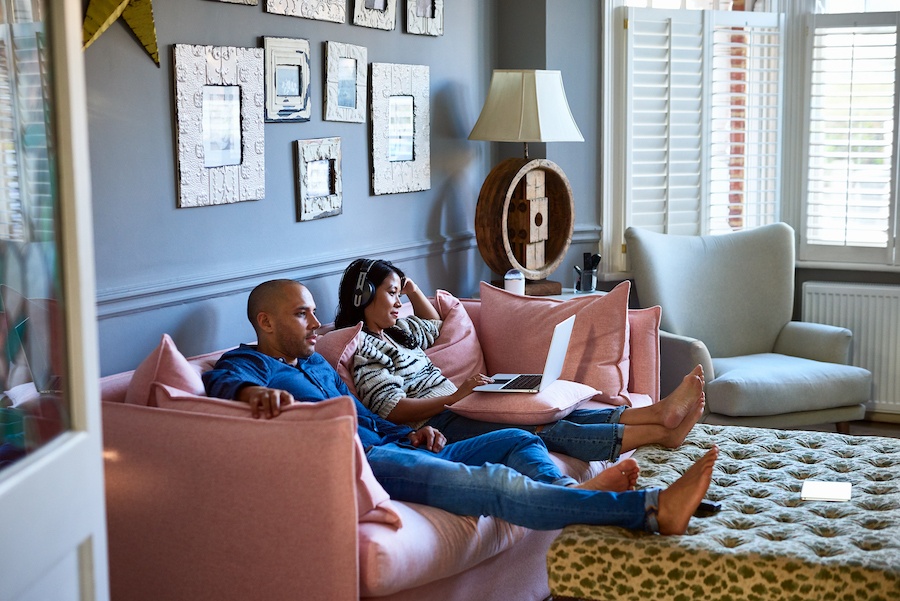How to Not Destroy Your Relationship While Quarantined with Your Partner
Some things to keep in mind, according to a local couples counselor.

Photo via Getty Images/10’000 Hours
In the span of days, you and your significant other probably went from bemoaning your busy schedules and how you don’t see each other enough to a very different reality of being stuck inside together 24/7, bickering about the proper direction to hang your toilet paper. If this sounds familiar, you’re in luck: We spoke with Danielle Green, an Arlington couples counselor and co-founder of the New England Center for Couples & Families, who shared with us her top tips to keep your relationship flourishing during this uneasy time. Take a deep breath, and read on for the quarantine relationship advice you need.
Be aware of how stress might impact your behavior.
If you’re finding yourself beginning to get annoyed at habits and quirks that once-upon-a-time you actually found endearing, you’re not alone. “Because this is such a stressful time, we have fewer emotional resources and we tend to be more sensitive and less flexible. We therefore become more easily triggered,” Green says. “Smaller things, like the way [your partner] chews food, that might not be a big deal when you’re feeling good and secure become a bigger deal. It’s sort of a way of discharging that overall stress.” The good news? Recognizing your temptation to nitpick is the first step to preventing it. Try to catch yourself before poking at your partner and ask where your feelings are actually coming from, Green suggests. If you find that you’re behaving in a way you normally wouldn’t, it’s probably less about your partner, and more about what’s happening within you emotionally, she adds. Make it a practice to remind yourself of the stress that you’re both under, and of the importance to be kind to yourself and your significant other now more than ever.
Respect each other’s coping styles, but also communicate your needs.
Everyone processes tragic events differently—even two people in the same household. And in addition to feeling differing levels of emotional distress, the two of you might also have different methods for managing those feelings. One partner may need more assurance from their other half, for instance, while the other may prefer to plow on with their day without much reflection. This is where clear communication comes in. If you feel you aren’t getting the emotional support you need from your partner, or conversely, if your partner’s constant need to discuss what’s happening in the news or talk through “what if” scenarios is causing you more anxiety, it’s time to open up a dialogue. “Couples who can move through this more easily are really those who can express themselves more emotionally to their partner, not with anger or disdain, but more with vulnerability. For example, they’ll say, ‘I’m scared, and I need you to tell me it’s going to be okay and that we’re going to be okay,’” Green says. On the other hand, she adds, if your partner isn’t able to offer the comfort you crave, it’s key “to understand [your partner’s behavior] as a coping strategy, rather than that they’re telling you, ‘What you’re going through is not important to me.’”
Make structure your new best friend.
“The couples that are thriving in this environment are those that are that are working together to straddle their calendars,” Green says, adding that this is especially important for pairs with kids at home. “You have to be pretty darn intentional about it.” This means sitting down together to create a daily schedule that builds in time for each of you to get work done, while also looking after little ones, getting exercise, and taking care of any other priorities. This may translate to one of you having a few hours of solo home office time while the other is more available to the children, and then having lunch together before swapping roles. It’s about creating a system that you can commit to and that works well for everyone involved.
Put regular alone time on your agenda.
Even if you’re both enjoying being under the same roof all day every day, your routine should also include some you-time. It’s not about getting away from each other, but rather taking an hour or two to invest in yourself, which will be beneficial for you both in the long run. “Some people might need more alone time than others, but for those who really need it, it’s very important to get that on the calendar,” Green says. This could include going for a walk by yourself, going into another room to listen to music, or setting up a virtual happy hour with friends. Work with your partner to make this a priority.
Practice essential habits of self-care.
Long story short: Looking after yourself isn’t just for you. Green stresses the importance of a healthy diet, exercise, and good sleep-hygiene (like not working in bed, for one) to keep your mental health in tip-top shape and set yourselves up for success as a duo. Secondly, be mindful of how you’re self-medicating during this time. Green says she’s noticed a “slight increase in alcohol and marijuana intake” in some clients, which can undoubtedly affect sleep and stress management. Not something you want to add to your relationship right now.
Keep the romance going however you can.
Fanning the flames of desire can be a bit challenging when you’re only seeing each other in sweatpants all day and you’re both behind on showers. But if doing so is important to you, it’s up to you to make putting in the effort a priority. That could entail actually getting dressed a few times a week, or planning a romantic night at home. “A date doesn’t necessarily have to be going to a restaurant or a play. Go back to the basics a little bit. It’s about asking, ‘How can we be intentional about nourishing our relationship in all kinds of ways?’” Green says.
Remember to see the silver lining.
Keep in mind that, even if we don’t know how long we’ll be quarantined in our homes, this situation is ultimately temporary. Try to enjoy the novelty of this uninterrupted time together and take advantage of it as much as you can. “People are really banding together in ways you only see in times of adversity,” Green explains. “There’s this kind of wholesomeness—having meals together, game nights, families out walking with their kids, having movie nights.”
Getting married? Start and end your wedding planning journey with Boston Weddings' guide to the best wedding vendors in the city.


